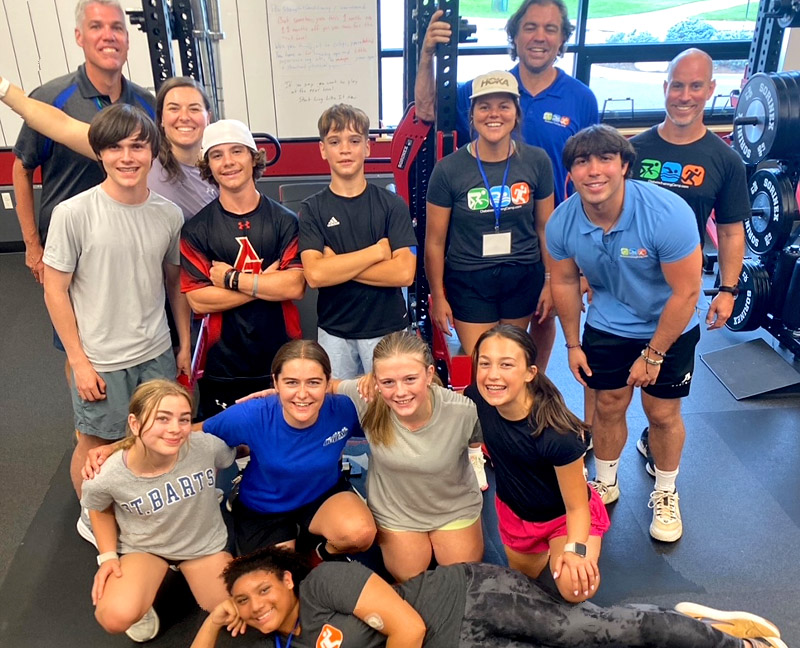Teen Boot Camp Empowers Young Athletes with Type 1 Diabetes to “Learn, Train, Connect”

For teens living with type 1 diabetes, staying active and managing blood sugar can be a balancing act that feels overwhelming. But at Diabetes Training Camp’s Teen Boot Camp, young athletes learn how to thrive — both on the field and in life — by combining sports performance with practical diabetes management.
The program, developed and led by Matthew Corcoran, MD, an endocrinologist with Shore Physicians Group, is designed for active teens with type 1 diabetes and their parents. Over the past several years, Dr. Corcoran and his team have built a program that blends elite-level sports training with education, community, and fun.
“It’s truly a sports performance camp,” said Dr. Corcoran. “We teach agility drills, speed skills, weightlifting, and running techniques — all while showing teens how to manage their diabetes on the fly.” The Teen Boot Camp welcomes about 20 teens and their parents each session, attracting athletes from across the country — from soccer, basketball, baseball and team sport athletes to runners and cyclists, dancers, hikers and even scouts.
The camp is supported by a roster of leading experts from some of the nation’s top institutions, including Boston Children’s Hospital, the Barbara Davis Center, Northwestern University, Stanford University, and the University of Colorado. The staff includes endocrinologists, exercise physiologists, diabetes educators, a licensed social worker, registered dietitians, and mental skills coaches who help athletes build resilience, focus, and confidence. “Mental skills coaches are what we used to call sports psychologists,” explained Dr. Corcoran. “They help athletes with goal setting, self-talk, visualization, and dealing with setbacks. For teens with diabetes, those tools are even more important because they face extra layers of challenge.”
Diabetes Training Camp Teen Boot Camp holds sessions, workouts and education for the parents of the teen athletes, too. Parents learn how to support and advocate for their teen and work on communication skills to foster an open and loving relationship. Parenting a teen with T1D comes with it’s own set of challenges and DTC helps the parents find a successful path forward.
The immersive three-day camp is held at two locations: Spooky Nook Sports in Lancaster, Pennsylvania, and the Colorado Academy in Denver. Participants and staff stay on site together, sharing meals and activities from 7 a.m. to 9 p.m. each day. Days are filled with multiple workouts, educational workshops, and community events, including barbecues, pool parties, and the camp’s famous kickball and dodgeball games. While the camp focuses on physical performance, Dr. Corcoran said one of the greatest benefits for participants is psychological.
“Our motto is ‘Learn, Train, Connect,’” he said. “The biggest benefit is connection. Teens come to camp feeling isolated — they’re the only kid with diabetes on their team or at their school. Here, they realize they’re not alone. They find a community that understands them, and parents do, too.”
For athletes with type 1 diabetes, managing blood glucose during exercise can be complicated. Physical activity, insulin, and adrenaline all influence glucose levels, which can rise or drop dramatically in minutes. “We teach them how to regulate their nutrition and insulin to keep their energy steady,” said Dr. Corcoran. “They learn when to eat, when to adjust insulin, and how to level the playing field so they can focus on performance, not numbers.” Many families arrive at camp without a plan for exercise and blood sugar management, leading to unpredictable highs and lows, taking their athlete out of the game. By the end of camp, participants leave with a roadmap — and the confidence — to safely pursue an active lifestyle and a plan to stay in the game.
Dr. Corcoran emphasizes that fitness is “the great equalizer.” Whether or not these teens become college or professional athletes, the lessons they learn at camp set them up for lifelong health. “We’re helping them build habits that will let them lead healthy, active lives,” he said. “If they can learn to manage exercise and diabetes now, they can handle whatever challenges come their way.”
Type 1 diabetes is an autoimmune condition in which the pancreas produces little or no insulin, the hormone that regulates blood sugar. It’s most often diagnosed in children and young adults, requiring lifelong insulin therapy. With proper management, people with type 1 diabetes can live long, healthy, and active lives.
Diabetes Training Camp operates as a volunteer-based, at-cost program. About half of all Teen Boot Camp registration fees are supported by the camp’s scholarship fund, ensuring families in need can participate. “We have a registration fee that covers a teen and a parent, and our scholarship fund helps families who need assistance get there,” Dr. Corcoran explained. “Currently, 40 to 50 percent of our registration dollars for the teen camp come from that scholarship fund.”
To help sustain these opportunities, the organization will host its 8th annual fundraiser, “Come Experience the Magic,” on November 14 at the Hard Rock Hotel & Casino in Atlantic City. Proceeds directly support scholarships for future campers. Learn more at diabetestrainingcamp.com/2025-come-experience-the-magic or make a donation and reserve your spot here.
For Dr. Corcoran and his team, the Teen Boot Camp is about more than sports — it’s about empowerment. Each teen who walks through the door leaves knowing they are not defined by diabetes, but strengthened by it. They gain not just the skills to manage their health, but the confidence to chase their goals — on the field, in the classroom, and throughout their lives. As Dr. Corcoran puts it, “If they can master this, they can handle anything.”